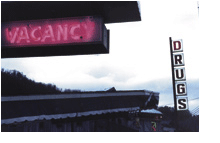Nashville Scene
March 8, 2008
Sad Soul: Altered Statesman play white soul with a bohemian edge
by Edd Hurt
 Steve
Poulton’s songs play like prematurely abandoned picaresques
of the urban, down-at-heel variety, and he sings his lyrics in
a damaged croon that’s actually soulful. On Altered Statesman’s
new self-titled full-length, Poulton and co-producer Joe McMahan
have perfected a minimalist funk that falters and swings like
it’s dead on its feet. But the head is alive. Altered
Statesman is a puzzle, and one of the most sophisticated
records a Nashville band has made in recent memory.
Steve
Poulton’s songs play like prematurely abandoned picaresques
of the urban, down-at-heel variety, and he sings his lyrics in
a damaged croon that’s actually soulful. On Altered Statesman’s
new self-titled full-length, Poulton and co-producer Joe McMahan
have perfected a minimalist funk that falters and swings like
it’s dead on its feet. But the head is alive. Altered
Statesman is a puzzle, and one of the most sophisticated
records a Nashville band has made in recent memory.
“It is soul music, but that’s the kind of thing you
say when somebody asks you what kind of music it is,” Poulton
says of Altered Statesman. He talks about soul like an
aficionado, so a conversation with the songwriter comes complete
with discursions on Chicago singers such as Major Lance and Otis
Leavill. Poulton goes deep with the genre—he can quote the
lyrics to George Clinton’s 1967 “All Your Goodies
Are Gone,” which he says the group are doing in their live
sets.
Poulton formed Altered Statesman in Dayton, Ohio, a decade ago.
“You see [Guided by Voices singer] Bob Pollard every day,
and you think, ‘Yeah, I can call my band whatever I want,
call it whatever I want,’ ” he says. “In those
days we never had a bass player. But I remember, one of the first
shows we did outside Dayton was at the Hideaway, an old cop bar
in Chicago. It was a benefit for the school band at [Chicago housing
project] Cabrini-Green. Otis Clay came, and they showed all these
great old films of Curtis [Mayfield] playing.”
On Altered Statesman Poulton sings like Mayfield, and
like Smokey Robinson and Boz Scaggs. It’s white soul with
a bohemian edge. Poulton plays vibes and a little piano, but pianist
Tony Crow—whose work graced Lone Official’s 2006 Tuckassee
Take—helps define nearly every song. If Poulton’s
compositions suggest a steady diet of Chi-Lites albums, the production
on “Evidence” recalls Arto Lindsay’s The
Subtle Body, on which Ryuichi Sakamoto’s piano and
Lindsay’s feel for atmosphere gave samba a catchy post-modernist
twist.
Altered Statesman is allusive and sounds oddly familiar—nowhere
more so than on “Bobby Rose,” for which Poulton contrives
a classic ’50s chord progression and a set of lyrics about
a doomed woman who is “dressed in last summer’s fashion.”
Poulton sings it exquisitely, and blithe vibes color a tale that’s
about a real person. Actually, the song isn’t funny.
“Last time I saw her, man, she was involved with some trumpet
player named Curtis,” Poulton says of the song’s subject—a
cousin of his. “She’d disappear for a few years at
a time, and then you’d get a call—oh, she’s
in the hospital with a broken arm. You can’t go back and
take a photograph of it, so you write a song.”
Cut mostly at Nashville’s House of David, Altered
combines the trailer-park skronk of Poulton and McMahan’s
guitars with organ, synth and Paul Griffith’s weightless
drumming. Richard McLaurin and Adam Bednarik engineered; every
spooky section of dead space has its rightful place in the band’s
aural universe. “The Ghost of Charlie Feathers” and
“’92 Astro” lope along, while the beautiful
“Viola Street” wanders down half-forgotten avenues
in a slow, sad shuffle.
“The Ghost of Charlie Feathers” is about another person
from Poulton’s past. “I’m from Salt Lake City
originally, and it’s about one of the guys I knew growing
up,” he says. “It was my mom’s sister’s
husband—one of her many husbands—Big Eddie, as opposed
to my cousin Little Eddie. He always had this slicked-back hair,
like [rockabilly singer] Charlie Feathers, and Big Eddie really
liked that rockabilly stuff. I don’t know exactly what he
was into, but he was a pervert.”
Whatever the context, the song communicates loss, nostalgia and
a bemused sense of tragedy. Throughout Altered Statesman
Poulton displays the eye and ear of a true writer, and gets the
details just right. “Charlie Feathers” mentions a
“ ’61 Imperial with the top cut down,” and the
opening lines of “ ’92 Astro” are perfectly
timed even as the words themselves arise out of situations only
Poulton could be expected to fully understand. “Whatever
happened to that kid Che Zastro / Rode off in his ’92 Astro,”
Poulton sings.
“C Cruise” casts the singer as a supplicant alone
at a pay phone on a day unrelieved by love or drugs. “I’ve
been calling since a quarter to five / Marking off the minutes
on my arm with this knife,” he sings. The only thing he’s
got left is this crummy memory, so he takes refuge in music: “The
jukebox plays Huey Smith and the Clowns / Oo-wee, oo-wee baby.”
It’s no sea cruise, and Altered Statesman is a
work of art that sounds like it could turn out to be an uplifting
experience for almost everyone involved.
back to top | back
to reviews


